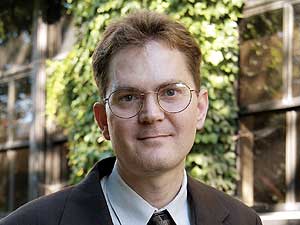|
Audio
Photos
Respond to this story
|
Minnesota native develops plan to end child abuse
November 30, 2004
Since the National Child Protection Training Center opened last year at Winona State University, it has drawn people from around the country. Detectives, social workers, and students visit to improve their skills at identifying and preventing child abuse. The Center's the creation of Minnesota native Victor Vieth. His goal is nothing less than eradicating child abuse in the United States.
Winona, Minn. — Once when Victor Vieth was a young prosecutor in southwestern Minnesota he took on a parental termination case. In court when the social worker took the stand, it was soon clear he was also new to his job and he'd made a number of mistakes. He had removed a baby from its home, despite not having the authority to do so under Minnesota law.
"I said 'Well, if you knew it was against the law why did you remove the baby that day?'" Vieth recalls. "He started crying and said 'The baby was covered in maggots. What else was I going to do?'"
It was a pivotal moment for Vieth. He says that was when he found his calling advocating on behalf of child victims. Years of work have culminated with the National Child Protection Center. It sits on the second floor of a sprawling building at his alma mater Winona State University.
The Center works with people on the frontlines of child abuse prevention. One important area is training professionals already in the field. Groups come from around the country to learn the skills.
At a recent session, Jose, a detective from Arkansas tries out some techniques by talking to little Becky Shapiro. She's actually played by an adult actress, by she's eerily convincing. At times she clutches a toy duck, plays with her hair and constantly twists around in her chair.
Over the course of the coversation Becky says she likes a tickle game that she plays with her neighbor Bill. It involves both of them getting naked. "What do you tickle with?" asks Jose.
Becky replies "You use your fingers."
Jose uses anatomically correct dolls and a drawing board so Becky can describe what happened. The whole time he asks questions, honing in on details that will help him make a case.
Questioning possible child abuse victims has become increasingly difficult in the wake of a recent Supreme Court ruling.
In Crawford vs. Washington a wife's tape-recorded statement against her husband was thrown out, on the grounds it violated his right to confront his accusers.
The ruling has repercussions for cases involving domestic violence, elder abuse and not least child abuse, where often times videotaped or otherwise recorded statements were considered admissible in the place of courtroom testimony.
Victor Vieth says the Crawford ruling is cause for concern, but he believes it's only a matter of time before the court is forced to review it again. He hopes at that point the justices settle on an interpretation that's more victim friendly.
Vieth has a much larger goal. He's working on a detailed plan for eradicating child abuse in America. It's a lengthy five-pronged strategy that starts with forcing those responsible for reporting child abuse to do their job. He's also working on an undergraduate curriculum directed at identifying and prosecuting child abuse cases. But most importantly Vieth says there needs to be a national no tolerance policy.
"We have a culture in the United States that permits a high level of child abuse," he explains.
Vieth says many people who should be working against child abuse aren't as aggressive as they should be. Dealing with child abuse is difficult. It can have political repercussions and it's expensive and time consuming. Vieth says people need to set that aside and protect children.
While Vieth says a lot needs to change, there is reason for optimism. He says until 1974 there wasn't a single full time federal employee responsible for monitoring the problem. That's no longer the case. Vieth says more has been done in the past 20 years to combat child abuse than in the first 200 years of U.S. history.
|
News Headlines
|
Related Subjects
|

